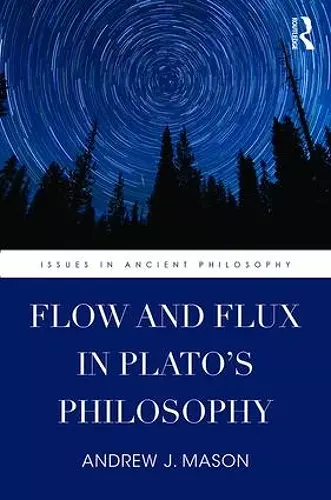Flow and Flux in Plato's Philosophy
Format:Hardback
Publisher:Taylor & Francis Ltd
Published:14th Mar '16
Currently unavailable, and unfortunately no date known when it will be back
This hardback is available in another edition too:
- Paperback£44.99(9780367873189)

In this bold new study, Andrew J. Mason seeks both to shed light on the key issue of flux in Plato’s work, and to show that there is also in Plato a notion of flow that needs to be distinguished from flux. Mason brings out the importance of this hitherto neglected distinction, and proposes on its basis a new way of understanding the development of Plato’s thought.
The opposition between the ‘being’ of Forms and the ‘becoming’ or ‘flux’ of sensibles has been fundamental to the understanding of Plato from Aristotle to the present day. One key concern of this volume is to clarify which kinds or levels of flux Plato accepts in sensibles. In addition, Mason argues that this traditional approach is unsatisfactory, as it leaves out the important notion of flow. Unlike flux, flow is a kind of motion that does not entail intrinsic change. It is also not restricted to the sensible, but covers motions of soul as well, including the circular motion of nous (intelligence) that is crucial in Plato’s later thought, particularly his cosmology. In short, flow is not incompatible with ‘being’, and in this study Plato’s development is presented, largely, as his arrival at this view, in correction of his earlier conflation of flux and flow in establishing the dichotomy between being and becoming.
Mason’s study offers fresh insights into many dialogues and difficult passages in Plato’s oeuvre, and situates Plato’s conception and usage of ‘flow’ and ‘flux’ in relation to earlier usage in the Greek poetic tradition and the Presocratic thinkers, particularly Heraclitus. The first study of its kind, Flow and Flux uncovers dimensions of Plato’s thinking that may reshape the way his philosophy is understood.
Andrew J. Mason’s book systematically develops the compelling idea that the early and middle Plato conflates flow and flux when opposing the changing world of sensible things to what truly is: while flow can be characterized as the continuous, directed motion and change of something, flux indicates a chaotic, intrinsic alteration that transform some fleetingly existent thing into something else. In the late Plato Mason finds traces of such a distinction that also show that only flux, but not flow, is incompatible with being. Mason’s investigation is very rich in its wide scope: not only does he look at a broad range of Platonic dialogues, and at the linguistic, cosmological, as well as ethical dimension of the distinction between flow and flux, he also persuasively situates Plato’s usage of the words "ῥοή" and "ῥέω” in the wider context of Pre-Platonic philosophers and poets.
- Barbara Settler, St. Andrews, UK
ISBN: 9781138918184
Dimensions: unknown
Weight: 476g
228 pages